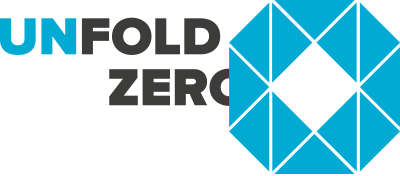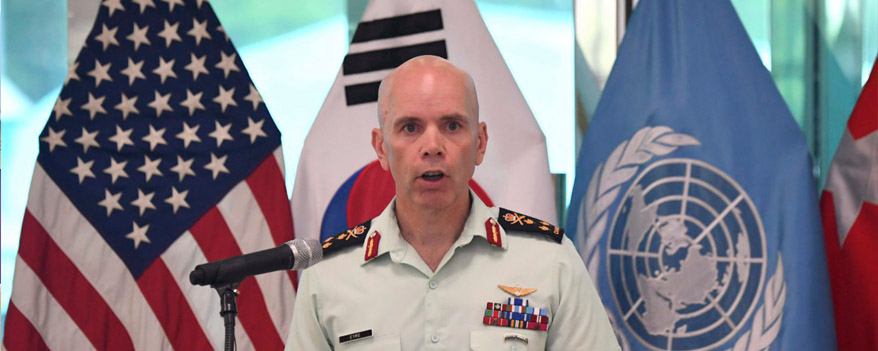Photo: Lt.-Gen. Wayne Eyre, deputy commander of the United Nations Command, speaks during a ceremony on July 27, 2018, commemorating the 65th anniversary of the signing of the Korean War Armistice agreement at the truce village of Panmunjom in the Demilitarized Zone that divides the two Koreas. (Jung Yeon-je /Pool Photo via AP)
On November 1, 2018, the National Interest published an article Can the United Nations Command Become a Catalyst for Change on the Korean Peninsula? The article raises interesting questions about the role of the United Nations in supporting a denuclearisation and sustainable peace process in Korea,
The Korean peace process is being led politically by the leaders of South Korea and North Korea, in conjunction with the US administration, through agreements being reached in a series of leadership summits.
The United Nations has a key responsibility to support the process, especially through the UN Secretary-General, Security Council and the UN Command in Korea.
UN Secretary-General
UN Secretary-General Antonio Guterres has spoken often to support a diplomatic solution to the Korean nuclear weapons and missiles issue (in particular the threats and counter-threats between North Korea and the USA in 2017) and in support of the peace process that started between South Korea and North Korea in early 2018. Such statements are useful encouragement, but have little legal or administrative weight.
In addition, UNSG Guterres has offered the use of UN mediation services to support the process. Such services can be very useful in a conflict regarding a specifc incidence or a simple conflict. They were used effectively, for example, by New Zealand and France to resolve the conflict over France’s bombing of the Rainbow Warrior (an environmental ship docked in Auckland harbour).
With regard to the Korean peace and denuclearisation process, the series of summits between North Korea and South Korea, and between North Korea and the USA, are probably the most promising approach for the initial stages of the process. Later in the process, the employment of the UNSG as an independent mediator might be useful, especially as the process moves towards a final peace agreement officially ending the Korean War.
UN Security Council
The UN Security Council has established a sanctions regime to put pressure on North Korea to denuclearise. As the diplomatic process progresses, graduated sanction relief will be necessary in order to provide incentives for North Korea to continue on the process, and also to enable the resumption and further development of economic cooperation especially between North and South Korea, which is vital to building a sustainable peace.
This point was highlighted by China’s Foreign Minister, Wang Yi at a UN Security Council session on North Korea on 27 September, who said that the Council should consider allowing a relaxation of some economic sanctions, if North Korea was in compliance with agreements reached in the summits between them, South Korea and the US, in order to ‘encourage DPRK and other relevant parties, to move denuclearization further ahead.”
Further, it was the UN which authorised the military action against North Korea in 1950 that launched the Korean War, a war that has not yet officialy ended. It will be important for the UN to support a peace agreement to formally end the war, once this is negotiated between the key parties.
UN Command
The United Nations Command (UNC) was established in 1950 to coordinate military action against North Korea. When the fighting ceased in 1953 and an armstice was adopted, the UNC remained in Korea to implement and oversee the armstice. In 1978, most of the armed forces of the UNC were transferred to the Republic of Korea – United States Combined Forces Command (CFC), which was taked primarily with the defence of South Korea. However, a small multinational unit of the UNC remained, with continuing responsibility to oversee the armstice agreement.
On October 22, the UNC convened a meeting at a three-sided table in the truce village of Panmumjom on the border that separates North Korea and South Korea. After a session that U.S. Forces Korea called “historic,” the UN Command announced that North and South Korea will withdraw firearms and guard posts at the Joint Security Area in the Demilitarized Zone, known as the DMZ, an operation that was completed on October 25. It was the latest effort by the two Koreas to implement the Comprehensive Military Agreement signed in September by Chairman Kim Jong-un and President Moon Jae-in at their third summit meeting in Pyongyang.
A few days earlier, in an operation also observed by the UNC commander , the two Koreas removed dozens of landmines in one section of the DMZ. And on October 26, in a separate bilateral meeting in the northern part of Panmunjom, generals from North and South agreed to demolish twenty-two of the front-line guard posts along the DMZ. They declared that all hostilities and accidental clashes along the border would be banned starting on November 1. The demilitarization project was verified by the UN Command.
These developments indicate that DPRK, ROK and the USA accept that the UNC can play an important role to oversee and verify confidence-building-measures and disarmament steps that can contribute to the Korean peace process.
As an example of the Command’s enhanced role in the peace process, the UNC has approved the movement of 5,700 people through the DMZ this year, not including the 400 or so North and South Koreans who crossed the border during the Olympics. In contrast, there were zero approvals in 2017.
“We consider the UNC to be revitalized,” says Canadian Lt. Gen. Wayne Eyre, the first non-U.S. general to serve as deputy commander of the UNC. “The Comprehensive Military Agreement is something we view as de-escalating tensions on the Korean Peninsula, and we’re working very hard as we speak to ensure its implementation.” The UNC “has a new life, new vitality and good forward movement,” he said at an October 5th event organized by the Carnegie Endowment for International Peace.
On the other hand, there are indications that DPRK still has strong reservations about the UNC.
On November 19, 2018, the state run media outlet DPRK Today ran an article accusing the United Nations Command (UNC) of acting as an “obstacle” to the improvement of inter-Korean relations. DPRK Today said that the U.S. had contrived a plan to intervene in the implementation of the September North-South military agreement, signed as an annex to the Pyongyang Joint Declaration, through the UNC. The article cited the decision by the UNC in August to disallow South Korean trains from crossing the military demarcation line (MDL) to conduct a joint on-site survey of sections of track to be used in future rail cooperation, a decision that the DPRK attributes to ‘US meddling.’ (See UNC “obstacle” to inter-Korean cooperation, military agreement: DPRK state media, NK News).
It’s possible that the UNC decision was related more to ensuring that cross-border operations do not violate current UN sanctions. However, the DPRK criticism does point to the need for increased institutional and political clarity about the UNC’s role in supporting the peace process.

